#Oliver Tambo
Text

24 notes
·
View notes
Text

Viva Umkhonto!
#art#artists on tumblr#digital art#vintage#expiremental#design#government#politics#history#ANC#apartheid#nelsonmandela#umkhonto we sizwe#SACP#Oliver Tambo#Chris Hani#Joe Slovo#Nelson Mandela#black consciousness#viva umkhonto#south africa#pan africanism#pan african#communism#socialism#anarchism#marxism#leftism#marxism leninism#cold war
24 notes
·
View notes
Text
In the international corporate media, the story is mostly portrayed either as a bilateral war between Israel and Gaza, or as one-sided, senseless Palestinian aggression devoid of any context. The missing context, of course, is that the Palestinian people have endured ages of colonial subjugation, especially Palestinians in the Gaza Strip.
As I said, the images are gruesome and horrifying. It is impossible not to be affected by them. However, they do not stand on their own. Beyond the aforementioned historical context, in the past two decades, Gaza has been reduced to dust time and again by Israeli air raids and military operations. Now, once again, the bombing has already started—and within the mainstream of Israeli society and its media, there is open discussion of carrying out a genocide in Gaza. If this is not prevented, it could indeed take place.
If we ask Palestinians to not turn to violence, we must not forget the reality they confront. When Palestinians in Gaza marched at the Israeli barrier that imprisons them in 2017-18, they were shot dead in the hundreds. The images circulating now are gruesome and shocking. I don’t intend to euphemize, justify, or condone—but in the course of struggle, the path to liberation almost always takes grotesque turns.
The African National Congress [one of the chief umbrella organizations that fought against apartheid in South Africa] is often ignorantly celebrated as a reference point by those who seek to argue that violence has no role in struggle. But after the establishment of its military wing, the MK [uMkhonto we Sizwe, “Spear of the Nation”], the ANC never renounced violence. Nelson Mandela [a member of the ANC and co-founder of the MK] refused to do so even after decades of imprisonment. In 1985, the then president of the ANC, Oliver Tambo, told the Los Angeles Times,
“In the past, we were saying the ANC will not deliberately take innocent life, but now, looking at what is happening in South Africa, it is difficult to say civilians are not going to die.”
The context of struggle here is between a nuclear military superpower and a dispossessed people. Colonialism does not relent. Colonialism will not step back of its own accord, not even if you ask nicely. Decolonialism is a noble cause, but the path to achieve it is often ugly and tainted by violence. In the absence of any realistic alternative to achieve liberation, people are forced into carrying out unjustifiable acts. It’s a fundamental reality of the disparity of power. To demand that the oppressed always act in the purest of ways is to demand they remain forever in servitude.
128 notes
·
View notes
Text
youtube
On Palestine, G4S, and the Prison-Industrial Complex Speech at SOAS in London
(Angela Davis, December 13, 2013)
Transcript from the book Freedom Is a Constant Struggle
When this event highlighting the importance of boycotting the transnational security corporation G4S was organized, we could not have known that it would coincide with the death and memorialization of Nelson Mandela.
As I reflect on the legacies of struggle we associate with Mandela, I cannot help but recall the struggles that helped to forge the victory of his freedom and thus the arena on which South African apartheid was dismantled. Therefore I remember Ruth First and Joe Slovo, Walter and Albertina Sisulu, Govan Mbeki, Oliver Tambo, Chris Hani, and so many others who are no longer with us. In keeping with Mandela’s insistence of always locating himself within a context of collective struggle, it is fitting to evoke the names of a few of his comrades who played pivotal roles in the elimination of apartheid.
While it is moving to witness the unanimous and continued outpouring of praise for Nelson Mandela, it is important to question the meaning of this sanctification. I know that he himself would have insisted on not being elevated, as a single individual, to a secular sainthood, but rather would have always claimed space for his comrades in the struggle and in this way would have seriously challenged the process of sanctification. He was indeed extraordinary, but as an individual he was especially remarkable because he railed against the individualism that would single him out at the expense of those who were always at his side. His profound individuality resided precisely in his critical refusal to embrace the individualism that is such a central ideological component of neoliberalism.
I therefore want to take the opportunity to thank the countless numbers of people here in the UK, including the many then-exiled members of the ANC and the South African Communist Party, who built a powerful and exemplary antiapartheid movement in this country. Having traveled here on numerous occasions during the 1970s and the 1980s to participate in antiapartheid events, I thank the women and men who were as unwavering in their commitment to freedom as was Nelson Mandela. Participation in such solidarity movements here in the UK was as central to my own political formation as were the movements that saved my life.
As I mourn the passing of Nelson Mandela I offer my deep gratitude to all of those who kept the antiapartheid struggle alive for so many decades, for all the decades that it took to finally rid the world of the racism and repression associated with the system of apartheid. And I evoke the spirit of the South African Constitution and its opposition to racism and anti-Semitism as well as to sexism and homophobia.
This is the context within which I join with you once more to intensify campaigns against another regime of apartheid and in solidarity with the struggles of the Palestinian people. As Nelson Mandela said, “We know too well that our freedom is incomplete without the freedom of the Palestinians.”
Mandela’s political emergence occurred within the context of an internationalism that always urged us to make connections among freedom struggles, between the Black struggle in the southern United States and the African liberation movements—conducted by the ANC in South Africa, the MPLA in Angola, SWAPO in Namibia, FRELIMO in Mozambique, and PAIGC in Guinea Bissau and Cape Verde. These international solidarities were not only among people of African descent but with Asian and Latin American struggles as well, including ongoing solidarity with the Cuban revolution and solidarity with the people struggling against US military aggression in Vietnam.
A half-century later we have inherited the legacies of those solidarities—however well or however badly specific struggles may have concluded—as what produced hope and inspiration and helped to create real conditions to move forward.
We are now confronted with the task of assisting our sisters and brothers in Palestine as they battle against Israeli apartheid today. Their struggles have many similarities with those against South African apartheid, one of the most salient being the ideological condemnation of their freedom efforts under the rubric of terrorism. I understand that there is evidence indicating historical collaboration between the CIA and the South African apartheid government—in fact, it appears that it was a CIA agent who gave SA authorities the location of Nelson Mandela’s whereabouts in 1962, leading directly to his capture and imprisonment.
Moreover, it was not until the year 2008—only five years ago—that Mandela’s name was taken off the terrorist watch list, when George W. Bush signed a bill that finally removed him and other members of the ANC from the list. In other words when Mandela visited the US after his release in 1990, and when he later visited as South Africa’s president, he was still on the terrorist list and the requirement that he be banned from the US had to be expressly waived.
The point I am making is that for a very long time, Mandela and his comrades shared the same status as numerous Palestinian leaders and activists today and that just as the US explicitly collaborated with the SA apartheid government, it continues to support the Israeli occupation of Palestine, currently in the form of over $8.5 million a day in military aid. We need to let the Obama administration know that the world knows how deeply the US is implicated in the occupation.
It is an honor to participate in this meeting, especially as one of the members of the International Political Prisoners Committee calling for the freedom of Palestinian political prisoners, recently formed in Cape Town, and also as a member of the jury of the Russell Tribunal on Palestine. I would like to thank War on Want for sponsoring this meeting and progressive students, faculty, and workers at SOAS, for making it possible for us to be here this evening.
This evening’s gathering specifically focuses on the importance of expanding the BDS movement—the boycott, divestment, and sanctions movement called for by Palestinian civil society—which has been crafted along the lines of the powerful model of the antiapartheid movement with respect to South Africa. While there numerous transnational corporations have been identified as targets of the boycott, Veolia for example, as well as Sodastream, Ahava, Caterpillar, Boeing, Hewlett Packard, and others, we are focusing our attention this evening on G4S.
G4S is especially important because it participates directly and blatantly in the maintenance and reproduction of repressive apparatuses in Palestine—prisons, checkpoints, the apartheid wall, to name only a few examples.
G4S represents the growing insistence on what is called “security” under the neoliberal state and ideologies of security that bolster not only the privatization of security but the privatization of imprisonment, the privatization of warfare, as well as the privatization of health care and education.
G4S is responsible for the repressive treatment of political prisoners inside Israel. Through Addameer, directed by Sahar Francis, we have learned about the terrifying universe of torture and imprisonment which is faced by so many Palestinians but also about their hunger strikes and other forms of resistance.
G4S is the third-largest private corporation in the world—behind Walmart, which is the largest, and Foxconn, the second largest.
On the G4S website, one discovers that the company represents itself as capable of providing protection for a broad range of “people and property,” from rock stars and sports stars to “ensuring that travelers have a safe and pleasant experience in ports and airports around the world to secure detention and escorting of people who are not lawfully entitled to remain in a country.”
“In more ways than you might realize,” the website reads, “G4S is securing your world.” We might add that in more ways that we realize, G4S has insinuated itself into our lives under the guise of security and the security state—from the Palestinian experience of political incarceration and torture to racist technologies of separation and apartheid; from the wall in Israel to prison-like schools in the US and the wall along the US-Mexico border. G4S-Israel has brought sophisticated technologies of control to HaSharon prison, which includes children among its detainees, and Damun prison, which incarcerates women.
Against this backdrop, let us explore the deep involvement of G4S in the global prison-industrial complex. I am not only referring to the fact that the company owns and operates private prisons all over the world, but that it is helping to blur the boundary between schools and jails. In the US schools in poor communities of color are thoroughly entangled with the security state, so much so that sometimes we have a hard time distinguishing between schools and jails. Schools look like jails; schools use the same technologies of detection as jails and they sometimes use the same law enforcement officials. In the US some elementary schools are actually patrolled by armed officers. As a matter of fact, a recent trend among school districts that cannot afford security companies like G4S has been to offer guns and target practice to teachers. I kid you not.
But G4S, whose major proficiencies are related to security, is actually involved in the operation of schools. A website entitled “Great Schools” includes information on Central Pasco Girls Academy in Florida, which is represented as a small alternative public school. If you look at the facilities page of the G4S website you will discover this entry: “Central Pasco Girls Academy serves moderate-risk females, ages 13-18, who have been assessed as needing intensive mental health services.” G4S indicates that they use “gender-responsive services” and that they address sexual abuse and substance abuse, et cetera. While this may sound relatively innocuous, it is actually a striking example of the extent to which security has found its way into the educational system, and thus also of the way education and incarceration have been linked under the sign of capitalist profit. This example also demonstrates that the reach of the prison-industrial complex is far beyond the prison.
This company that provides “security” for numerous agencies as well as rehabilitation services for young girls “at risk” in the United States, while operating private prisons in Europe, Africa, and Australia, also provides equipment and services to Israeli checkpoints in the West Bank along the route of Israel’s apartheid wall as well as to the terminals from which Gaza is kept under continuous siege. G4S also provides goods and services to the Israeli police in the West Bank, while it offers security to private businesses and homes in illegal Israeli settlements in occupied Palestine.
As private prison companies have long recognized, the most profitable sector of the prison-industrial complex is immigrant detention and deportation. In the US, G4S provides transportation for deportees who are being ushered out of the US into Mexico, thus colluding with the increasingly repressive immigration practices inside the US. But it was here in the UK where one of the most egregious acts of repression took place in the course of the transportation of an undocumented person.
When I was in London during the month of October, speaking at Birkbeck School of Law, I spoke to Deborah Coles, codirector of the organization Inquest, about the case of Jimmy Mubenga, who died at the hands of G4S guards in the course of a deportation from the UK to Angola. On a British Airways plane, handcuffed behind his back, Mubenga was forcibly pushed by G4S agents against the seat in front of him in the prohibited “carpet karaoke” hold in order to prevent him from vocalizing his resistance. The use of such a term for a law enforcement hold, albeit illegal, is quite astonishing. It indicates that the person subject to the hold is compelled to “sing into the carpet”—or in the case of Mubenga—into the upholstered seat in front, thus rendering his protests muffled and incomprehensible. As Jimmy Mubenga was held for forty minutes, no one intervened. By the time there was finally an attempt to offer him first aid, he was dead.
This appalling treatment of undocumented immigrants from the UK to the US compels us to make connections with Palestinians who have been transformed into immigrants against their will, indeed into undocumented immigrants on their own ancestral lands. I repeat—on their own land. G4S and similar companies provide the technical means of forcibly transforming Palestinian into immigrants on their own land.
As we know, G4S is involved in the operation of private prisons all over the world. The Congress of South African Trade Unions (CO-SATU) recently spoke out against G4S, which runs the Mangaung Correctional Centre in the Free State. The occasion for their protest was the firing of approximately three hundred members of the police union for staging a strike. According to the COSATU statement:
G4S’s modus operandi is indicative of two of the most worrying aspects of neoliberal capitalism and Israeli apartheid: the ideology of “security” and the increasing privatization of what have been traditionally state run sectors. Security, in this context, does not imply security for everyone, but rather, when one looks at the major clients of G4S Security (banks, governments, corporations etc.) it becomes evident that when G4S says it is “Securing your World,” as the company slogan goes, it is referring to a world of exploitation, repression, occupation and racism.
When I traveled to Palestine two years ago with a delegation of indigenous and women-of-color scholar/activists, it was the first time the members of the delegation had actually visited Palestine. Most of us had been involved for many years in Palestine solidarity work, but we were all thoroughly shocked to discover that the repression associated with Israeli settler colonialism was so evident and so blatant. The Israeli military made no attempt to conceal or even mitigate the character of the violence they inflicted on the Palestinian people.
Gun-carrying military men and women—many extremely young—were everywhere. The wall, the concrete, the razor wire everywhere conveyed the impression that we were in prison. Before Palestinians are even arrested, they are already in prison. One misstep and one can be arrested and hauled off to prison; one can be transferred from an open-air prison to a closed prison.
G4S clearly represents these carceral trajectories that are so obvious in Palestine but that also increasingly characterize the profit-driven moves of transnational corporations associated with the rise of mass incarceration in the US and the world.
On any given day there are almost 2.5 million people in our country’s jails, prisons, and military prisons, as well as in jails in Indian country and immigrant detention centers. It is a daily census, so it doesn’t reflect the numbers of people who go through the system every week or every month or every year. The majority are people of color. The fastest-growing sector consists of women —women of color. Many are queer or trans. As a matter of fact, trans people of color constitute the group most likely to be arrested and imprisoned. Racism provides the fuel for maintenance, reproduction, and expansion of the prison-industrial complex.
And so if we say abolish the prison-industrial complex, as we do, we should also say abolish apartheid, and end the occupation of Palestine!
In the United States when we have described the segregation in occupied Palestine that so clearly mirrors the historical apartheid of racism in the southern United States of America—and especially before Black audiences—the response often is: “Why hasn’t anyone told us about this before? Why hasn’t anyone told us about the segregated highways leading from one settlement to another, about pedestrian segregation regulated by signs in Hebron—not entirely dissimilar from the signs associated with the Jim Crow South. Why hasn’t anyone told us this before?”
Boycott G4S! Support BDS!
Just as we say “never again” with respect to the fascism that produced the Holocaust, we should also say “never again” with respect to apartheid in South Africa, and in the southern US. That means, first and foremost, that we will have to expand and deepen our solidarity with the people of Palestine. People of all genders and sexualities. People inside and outside prison walls, inside and outside the apartheid wall.
Palestine will be free!
Thank you.
23 notes
·
View notes
Text
Südafrika 2022/23 - Tag 2
Herrschaften und Oukies!
Trotz der gestrigen Widrigkeiten sind wir, mit einer leichten Verspätung, in Johannesburg gut angekommen.

Immer wieder begeistert uns dieses geschmackvolle Kunstwerk. Der aktuelle Präsident Ramaphosa enthüllte im Oktober 2020 eine Statue zu Ehren des “unermüdlichen Kämpfers” Oliver Reginald Tambo am gleichnamigen Flughafen, exakt 103 Jahre nach seiner Geburt.
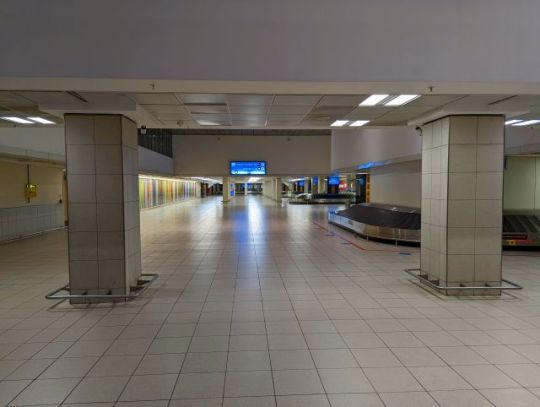
Hier hat uns der Meet & Greet Assistenz Service abgeholt und bei allen Kontrollen an den Schlangen vorbei assistiert und zack, schon waren wir am Gepäckband. Das Priority Baggage war auch schon da. Siehste in Johannesburg klappt das - in Europa nicht immer.

Der reizende Gentleman ließ es sich nicht nehmen uns noch persönlich bis zum Büro des Autoverleihers zu begleiten. Das hatte natürlich den Vorteil, dass uns die ganzen selbsternannten “Helfer” erst gar nicht anquatschten.
Auf dem Klo merke ich, dass ich jetzt wirklich alt bin. Der Toiletten Boy bedankt sich für mein Trinkgeld mit den Worten “Dankie Mama!” Ich überlege, ob ich bei unserer Rückkehr schon einmal einen Termin zum Probeliegen vereinbare ...
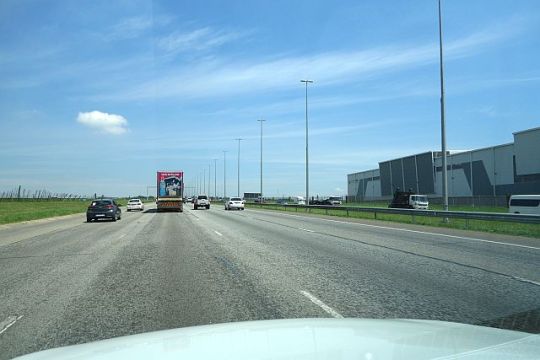
Bei der Ausfahrt aus dem Parkhaus habe ich dieses Mal extra auf dieses ominöse Stoppschild geachtet, das in den letzten Wochen immer wieder zu unschönen Zwischenfällen mit der Polizei und Umverteilungen von unterschiedlichen Bargeldsummen führte.
Ich kann versichern, dass das Schild da wirklich steht! Allerdings so bescheuert, dass fast jeder dran vorbei scheppert. Wir waren die Einzigen, die da heute Morgen tatsächlich stoppten. Jedoch war heute keine Polizei weit & breit zu sehen.

Wieder sind wir über die Toll-Maut-Stationen total begeistert!
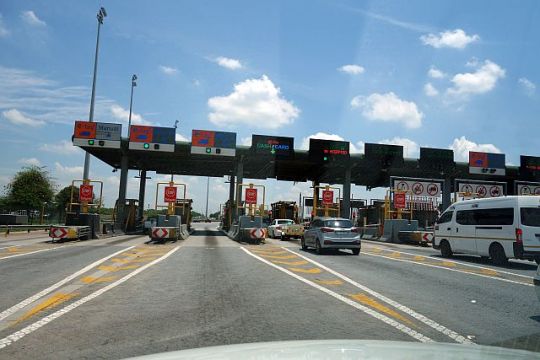
So, jetzt aber! Immer schön dem Navi nach in Richtung Norden und über Pretoria nach Hammanskraal.
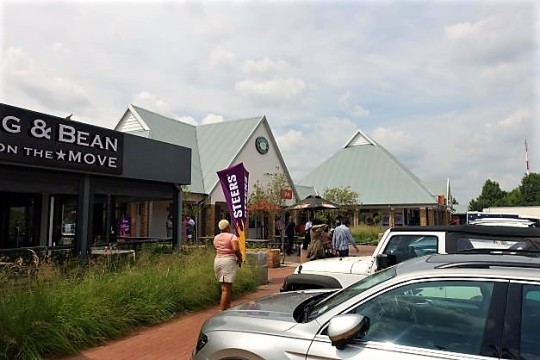
An der Autobahn Raststätte pappten wir erst einmal das Navi gescheit an die Windschutzscheibe!
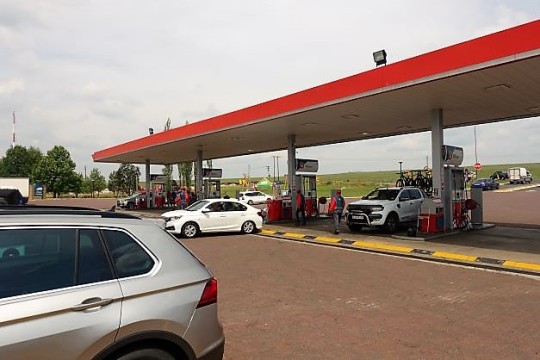
Nach 1 1/2 Stunden fuhren wir von der N 1 ab, sofort rechts abbiegen, nach der N1 sofort wieder links und immer der Straße nach.

Die Gegend sieht nicht besonders vertrauenserweckend aus:
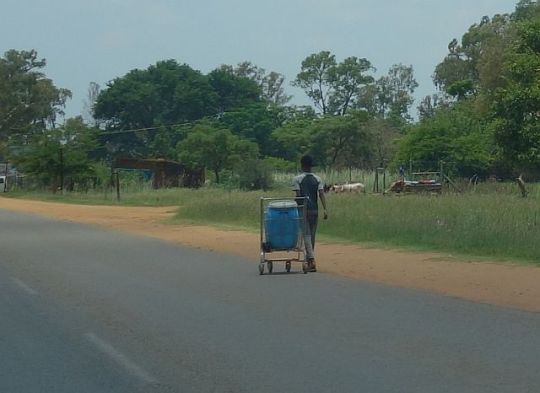
Aber das ist tatsächlich die Zufahrt zum Hauptgate des Dinokeng Game Reserve.
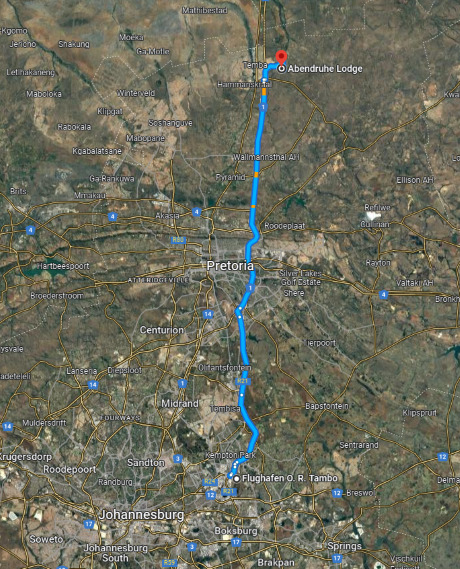
Hier, im Dinokeng Game Reserve, werden wir die ersten 4 Nächte verbringen.

Im Dinokeng waren wir bereits im letzten Jahr. Da allerdings in der Kwalata Game Lodge. Das war okay, aber mehr auch nicht und deshalb entschieden wir uns in diesem Jahr für die “Abendruhe Lodge”.
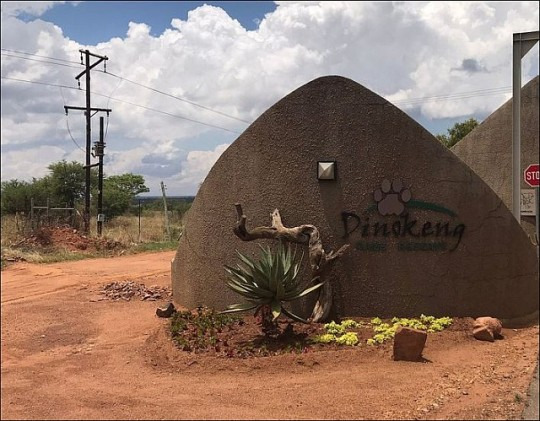
Wo wir wieder beim Thema “alt” sind ...

Wie man dem Namen bereits entnehmen kann, gehört diese deutschen-stämmigen Nachkommen. Gerade einmal 4 Chalets (Selbstversorger) stehen auf dem Gelände für Gäste zur Verfügung. Die Kritiken sind sehr gut und wir sind gespannt.

Auf dem Dinokeng Gelände befinden sich eine Fülle von Unterkünften. Vom Camping über B&B bis zur Lodge ist für jeden Geschmack etwas dabei. Aufmerksam wurden wir auf das Game Reserve durch einen Bericht im Südafrika Magazin, das ich seit Jahren beziehe.
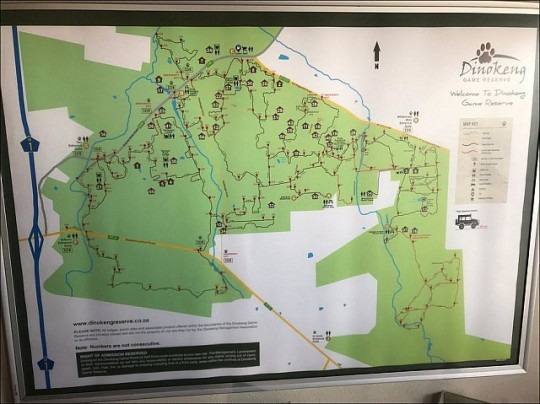
Der Weg zur Lodge ist gleich ein kleiner Game Drive. Wir hatten die Fenster herunter gelassen, um Afrika zu riechen. Es roch nach Elefanten. Gesehen haben wir leider keine, nur die entsprechenden Warnschilder.
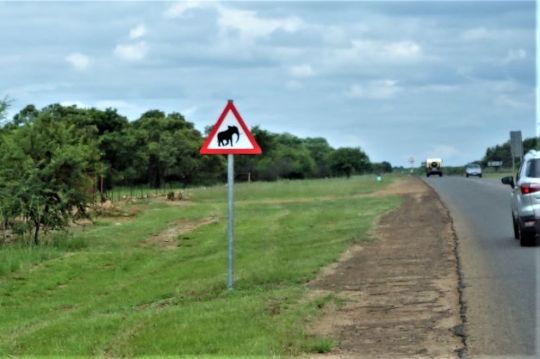
Dafür sahen wir einige Nyala Antilopen Weibchen, etliche Tokos, Webervögel, Go-away-Birds und natürlich die allgegenwärtigen Impalas. Das ist doch schon was!
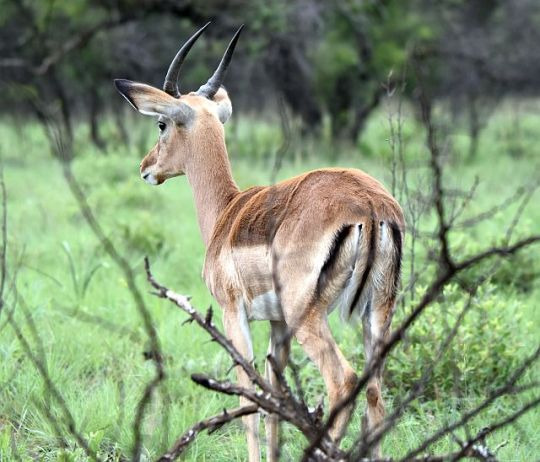
Das Dinokeng Game Reserve hat die berühmten Big 5 und bietet erste Möglichkeiten zur Wildbeobachtung. Es ist ein prima Zwischenstopp ohne Malariarisiko, nur eine gute halbe Autostunde von Pretoria und eine gute Autostunde nördlich des internationalen Flughafens OR Tambo entfernt.

Im vergangenen Jahr hatten wir hier nur 2 Übernachtungen eingeplant und das hat sich im Nachhinein als viel zu wenig erwiesen.

Da wir zu früh im Dinokeng zum einchecken in der Abendruhe Lodge (ab 15 Uhr) sind, nutzen wir die Gelegenheiten und fahren durch, bis zur Arlington Brewery and Cidery.
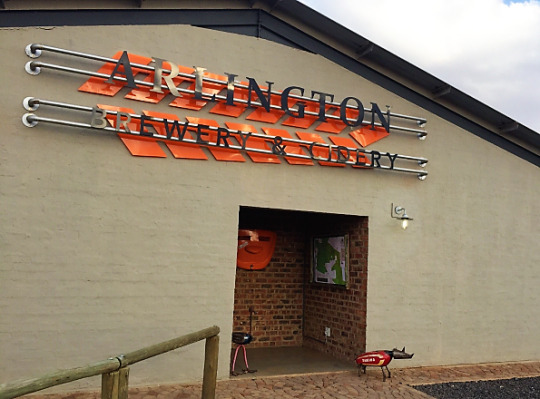
Da wir wieder super-blind sind, fahren wir an der Zufahrt gleich 2x vorbei. Die Schilder könnten wirklich größer sein, damit so Vollpfosten, wie wir, die einfach besser sehen.
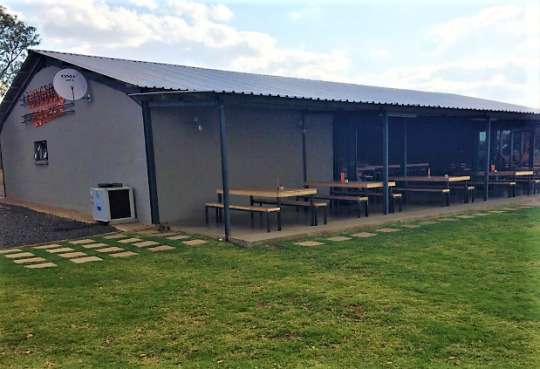
Diese Mikro-Brauerei wurde 2017 gegründet und ist heute schon fester Bestandteil der offiziellen Brauerei Route, die besonders originelle Craft Beer Brauereien auflistet.
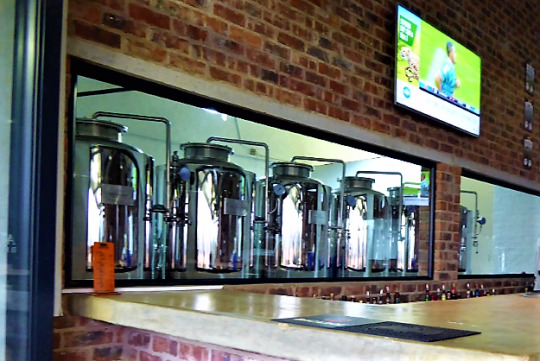
Die Brauerei stellt verschiedene Biersorten her. Unter anderem sind das: Red Hartebeest Ale, Bushveld Bliksem Lager, Boris the Buffalo Stout und Bushpig Bugger Pilsner.

Es wird auch mit Apfelwein (Cider) und Gin experimentiert.

Welche Spirituose tagesaktuell gerade im Ausschank ist, kann man dieser Wand hier entnehmen:

Neben dem Bierbrauen bietet der Veranstaltungsort auch Mahlzeiten in seinem angeschlossenen Restaurant an.

Das es sich bei den Inhabern um PS-Fans, also sozusagen positiv bekloppte Fahrzeugsammler handelt, wird direkt am Eingang schon klar.
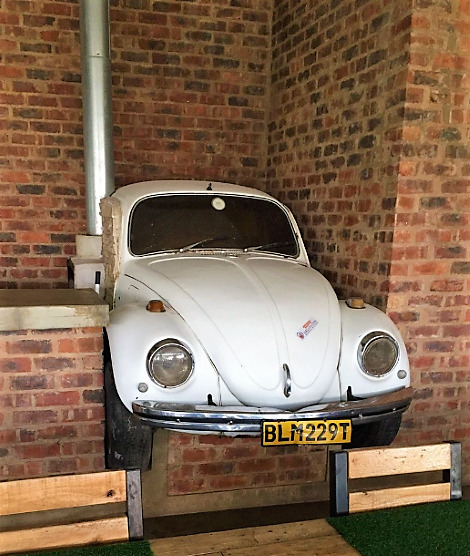
Der absolute Knaller ist jedoch dieser Pizzaofen:

Dieser alte VW-Käfer wurde entkernt, in die Wand einbetoniert und ein Pizza-Ofen hineingemauert. Was für ein eine krasse Idee!
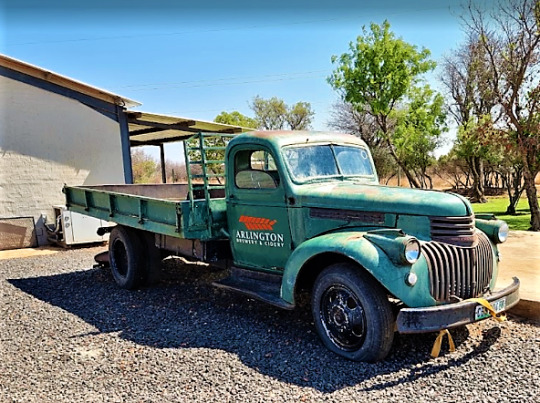
Aber auch der Außenbereich bietet originelle PS-lastige Sitzgelegenheiten. Was macht der LKW da und wie komme ich da überhaupt hoch?
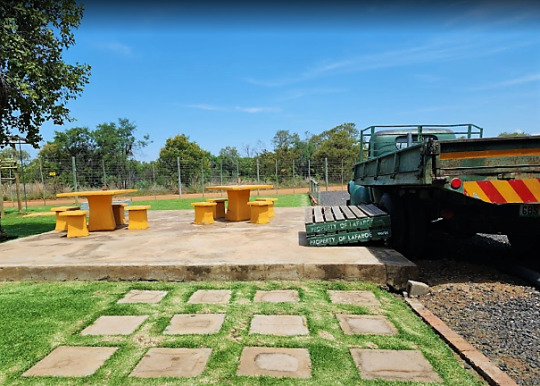
Über die olle Europalette kraxelt man da hoch. Das wäre bei uns schon wieder gar nicht erlaubt.

Wir bestellen uns das Tasting Brett mit verschiedenen, tagesaktuellen Produkten. Dazu einen Piggi Burger für den Fahrer und für mich einen Bad Ass Salat! Wenn schon alt, dann wenigstens Bad Ass!
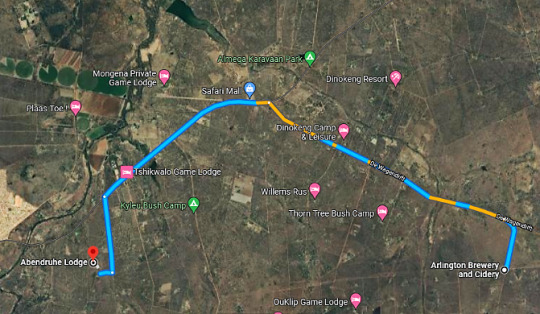
Danach geht es dann gemütlich zur Abendruhe Lodge. Auf der Piste sehen wir, dass trotz der Geschwindigkeitsbegrenzung von 30 km/h, ein paar Arschgeigen es tatsächlich geschafft haben einen jungen Schakal zu überfahren. Mir fehlen da immer die Worte! Muss man denn in einem Wildreservat so rasen?
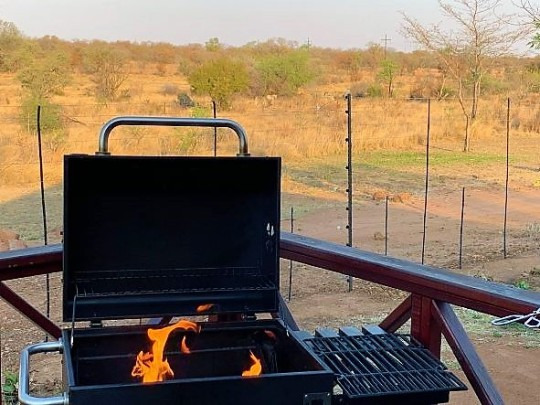
Zu unserem Chalet gehört ein Grill auf der Terrasse sowie eine eigene Boma mit einer offenen Feuerstelle. Da kann man durchaus am Abend zünftig eine Boerewors auf den Grillrost hauen.
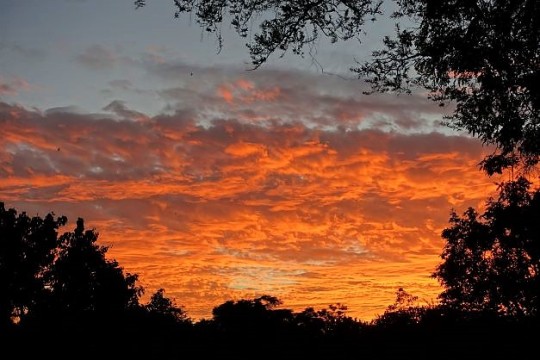
Morgen fahren wir zur Safari Shopping Mall zum Einkauf und Gamedriven wollen wir auch.
Lekker Slaap!
Angie, Micha und der Hasenbär
12 notes
·
View notes
Text
Took the bus to Soweto one day and mistakenly didn’t get out at the right bus station to transfer to Vilakazi Street (the main touristy street in Soweto).

Luck would have it, I met Bongani who lived just off Vilakazi AND he had the day off. We ended up spending the whole day together and he played tourist in his own neighborhood. We went by Desmond Tutu’s house and then we went into Nelson Mandela’s old house (which is now a museum).
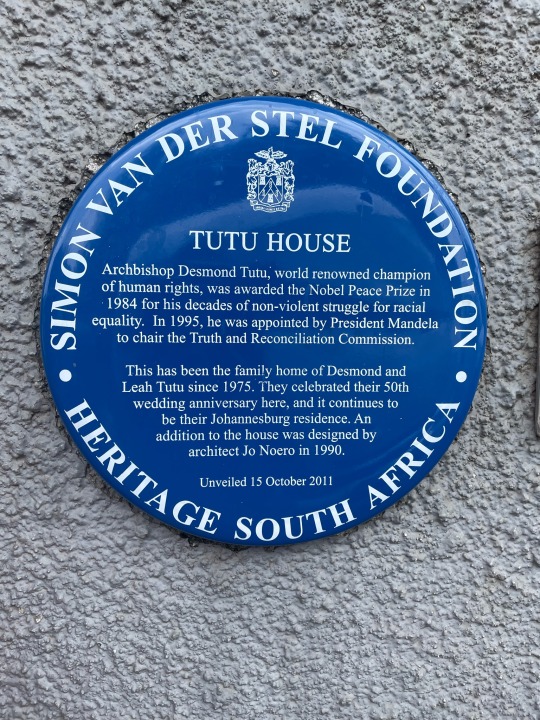
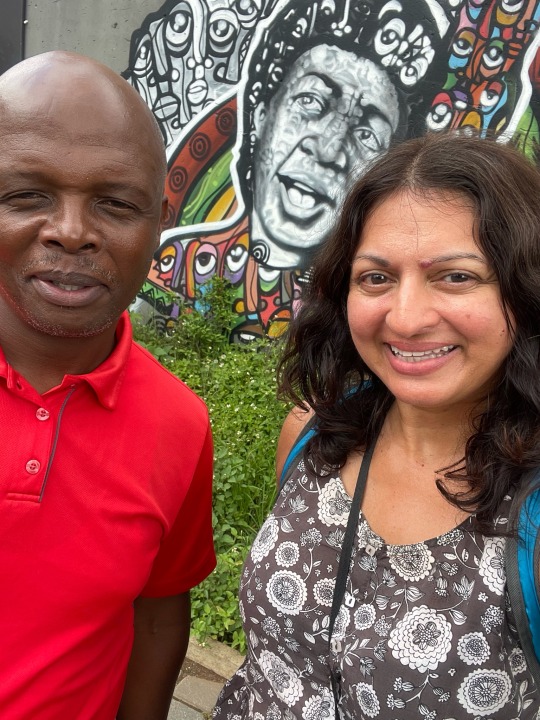
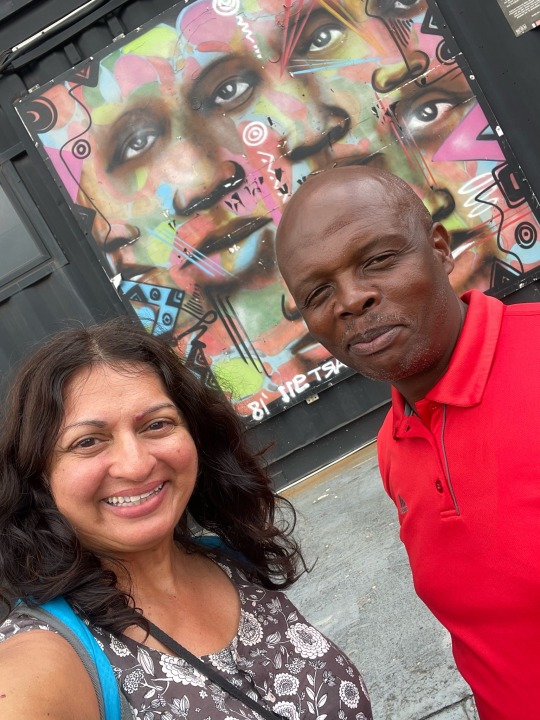
We walked around and saw murals, talked history, life, work, love. AND, he even welcomed me into his home and we hung out there for a bit. It was so much fun!



In 1976 was the Soweto Uprising where Hector Peterson was murdered for speaking up against having to learn the language Afrikaans in school. It was being forced upon all Black kids by the apartheid government. This memorial and museum was erected in memory of his bravery.

Bongani and I had sandwiches at a cafe which had this mural in it. (He had translated it for me, but I don’t remember what he said). It’s haunting, that’s what drew me to it. The title translates to “What is it”.
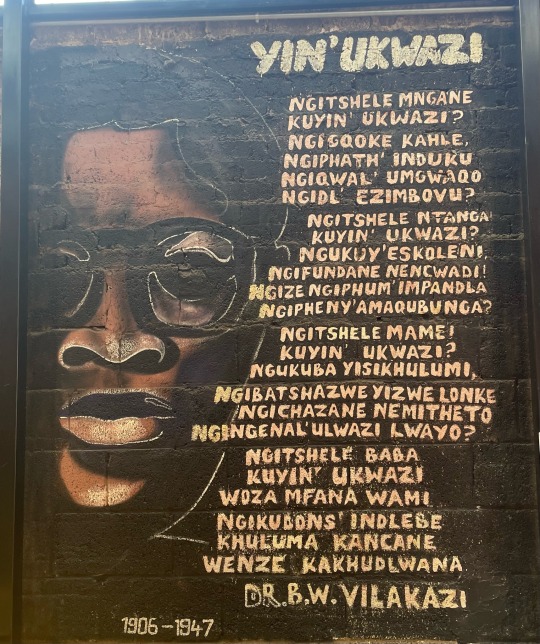
Oliver Tambo ✊🏽✊🏽✊🏽An anti-apartheid legend.

3 notes
·
View notes
Text
Nelson Mandela: An ideal for which I am prepared to die - part 1 & part 2
The text of the statement made by Nelson Mandela from the dock at the opening of his trial on charges of sabotage at Supreme Court of South Africa, Pretoria on April 20 1964.
I am the first accused. I hold a bachelor’s degree in arts and practised as an attorney in Johannesburg for a number of years in partnership with Oliver Tambo. I am a convicted prisoner serving five years for leaving the…
View On WordPress
0 notes
Text




IMAGENES Y DATOS INTERESANTES DEL DIA 2 DE MARZO DE 2024
Día Mundial del Bienestar Mental para Adolescentes, Año Internacional de los Camélidos.
San Lucio.
Tal día como hoy en el año 1990
En Sudáfrica, Nelson Mandela resulta elegido vicepresidente del CNA (Congreso Nacional Africano, su partido). El 6 de julio del año que viene será nombrado presidente por aclamación, sustituyendo a Oliver Tambo. Junto al presidente de la República, Frederik De Klerk, iniciarán el desmantelamiento del apartheid y la transición a una democracia multirracial. (Hace 34 años)
1972
Desde EE.UU. se lanza al espacio la "Pioneer 10", primera sonda espacial destinada a cruzar el cinturón de asteroides y tomar fotografías de Júpiter, que abandonará el Sistema Solar en 1983. En diciembre de 1973 alcanzará Júpiter y enviará las primeras fotografías. Diez años más tarde, la nave dejará el sistema solar. En el 34.600 d. C., y en su largo viaje hacia la constelación de Tauro, está previsto que la Pioneer 10 pase próxima a otra estrella, Ross 249. En la sonda se ha enviado un disco óptico conteniendo información y fotos de nuestro planeta y sus habitantes, además de un mapa espacial indicando la situación del Sistema Solar y de la Tierra. También se envían saludos en más de 100 lenguas terrestres. (Hace 52 años)
1956
Marruecos obtiene la independencia de Francia y el sultán Mohamed V forma su primer gobierno. (Hace 68 años)
1944
En España, por iniciativa de la Presidencia de Gobierno, o lo que es lo mismo, del general Franco, un decreto establece la creación del Documento Nacional de Identidad para tener más y mejor controlados a los españoles. Los primeros obligados en tenerlo serán los presos y los que permanecen en libertad vigilada. En segundo lugar, los varones que por su profesión o negocio cambien con asiduidad de domicilio. En tercer lugar, los hombres residentes en ciudades de más de 100.000 habitantes. Luego, los varones que habiten en localidades entre 25.000 y 100.000 habitantes, después las mujeres que viajen por motivos de trabajo y así sucesivamente hasta completar en unos años el total de la sociedad. (Hace 80 años)
1821
El movimiento "ludita", que proclama la destrucción de maquinaría tecnológica por hacer que el hombre pierda su capacidad laboral y por ende creativa al plegarse de manera esclavista a las formas de tecnología, logrando más productividad en el trabajo en términos de rapidez y no en capital humano, tiene en la localidad de Alcoy su primer exponente en España, cuando 1.200 hombres en paro armados organizan un motín y rompen y queman 17 máquinas de hilar, exigiendo al Ayuntamiento que desmonte las restantes. (Hace 203 años)
1561
En el Valle de Güentota en la actual Argentina, el español Pedro del Castillo funda la ciudad de Mendoza, y le pone el nombre de Mendoza del Nuevo Valle de La Rioja, en honor al gobernador y capitán general de Chile, García Hurtado de Mendoza. El 28 de marzo de 1562 la ciudad será trasladada muy cerca de allí por el capitán Juan Jufré. (Hace 463 años)
1498
El navegante portugués Vasco da Gama y su flota, tras tener que soportar fuertes tempestades y sofocar una revuelta de los marineros, llegan a la isla de Mozambique en el transcurso de su primer viaje a la India. (Hace 526 años)
0 notes
Text
UNTO HIMSELF
UNTO HIMSELF
under the radar
as under
as can be
even now
my own paranoia
is trying to find me
hit squad flying
into Oliver Tambo
running through my head
the hackneyed plot
of every
cheap disaster movie
and then, of course,
there is Benjamin Netanyahu,
sublime revelation
unto himself
0 notes
Text
Nelson Mandela, tutto per il Sudafrica

L’uomo che cambiò per sempre la storia del Sudafrica del Novecento…
Nelson Mandela nacque il 18 luglio 1918 nella famiglia reale dei Thembu, una tribù di etnia Xhosa che viveva in una fertile valle del Capo Orientale del Sudafrica.
Il suo nome in lingua Xhosa, Rolihlahla, ha un significato profetico, poiché tradotto diventava attaccabrighe e venne chiamato Nelson solo quando iniziò a frequentare il collegio coloniale britannico di Healdtown e gli fu dato dall’insegnante, che sceglieva nomi inglesi per i ragazzini sudafricani, al posto di quelli impronunciabili tribali.
Già da studente, mentre frequentava l’Università di Fort Hare emerse la forza di volontà di Mandela e la sua rabbia per l’ingiustizia, fu espulso dall’università nel 1940 per aver guidato una manifestazione studentesca insieme a Oliver Tambo.
A 22 anni trovò lavoro come guardiano alle Crown Mines di Johannesburg, mentre la politica cominciò a giocare un ruolo molto significativo nella sua vita.
Spinti dall’umiliazione e dalle sofferenze della loro gente, e offesi dalle leggi sempre più ingiuste, nel 1944 Nelson, Walter Sisulu e Oliver Tambo insieme ad altri costituirono la Lega Giovanile dell’ANC e in pochi anni Mandela ne divenne presidente.
Completati i suoi studi di legge all’Università del Witwatersrand, Mandela con Tambo avviò il primo studio legale per i neri e si dedicò anima e corpo una campagna non violenta di disobbedienza civile, aiutando ad organizzare scioperi, marce di protesta e manifestazioni contro le leggi discriminatorie.
Mandela venne arrestato per la prima volta nel 1952 e poi venne assolto, ma seguirono arresti e detenzioni, culminati nel Processo per Tradimento del 1958, che si concluse nel 1961 con l’assoluzione.
Dopo il processo, di fronte alle crescenti repressioni e la messa a bando dell’ANC, la lotta armata diventò l’unica soluzione, ma nel 1962 Mandela fu arrestato di nuovo per alto tradimento e fu condannato a cinque anni di carcere.
Mentre scontava la condanna, fu nuovamente accusato di sabotaggio al processo di Rivonia e una sua appassionata arringa, durata 4 ore, finì con la famosa frase “Ho nutrito l’ideale di una società libera e democratica, in cui tutte le persone vivono insieme in armonia… Questo è un ideale per cui vivo e che spero di realizzare. Ma se è necessario, è un’ideale per il quale sono pronto a morire”.
Nel 1964 Mandela fu giudicato colpevole di sabotaggio e alto tradimento e fu condannato a scontare l’ergastolo a Robben Island.
A metà degli anni Ottanta la crescente condanna internazionale portò a colloqui segreti tra il governo e Mandela e finalmente alla sua liberazione l’11 Febbraio 1990, a cui seguirono le trattative per la transizione democratica del paese.
Nel maggio 1994, Mandela fu eletto Presidente del Sudafrica nelle prime elezioni a suffragio universale e nel 1999 si ritirò ufficialmente dalla vita pubblica, ma non interruppe mai la sua azione umanitaria, portando la sua battaglia per la pace e la comprensione umana oltre i confini del Sudafrica.
Nelson Mandela morì il 5 dicembre 2013 nella sua casa di Johannesburg.
Read the full article
0 notes
Video
youtube
Professor Ibbo Mandaza delivering Oliver Tambo School of Leadership publ...
0 notes
Text
Work begins on Britain's first centre to the anti-apartheid movement
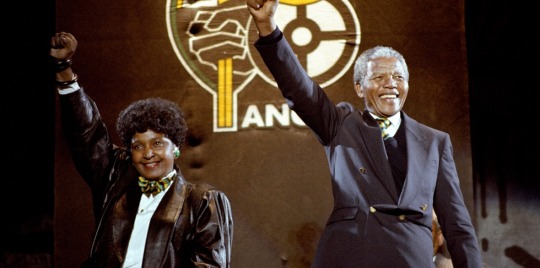
WORK on Britain’s first centre dedicated to the anti-apartheid movement is set to begin in London following a £1.2 million National Lottery Heritage Fund grant, a charity has announced.
As the Morning Star reported, the site of the former headquarters of the African National Congress (ANC) in Penton Street, Islington, will be restored to create the Anti-Apartheid Legacy Centre of Memory & Learning, social justice body the Liliesleaf Trust said.
Between 1978 and 1994, the building was a hub for coordinating international opposition to South African apartheid, a system of institutionalized racial segregation designed by the descendants of white settler populations.
The London site was home to ANC leaders Oliver Tambo and Thabo Mbeki, who eventually replaced Nelson Mandela as South African president in 1999 following the country’s transition to inclusive democracy.
#london#south africa#apartheid#nelson mandela#winnie mandela#manchester#black history month#black lives matter#education#world history#anti racism#liverpool#uk#scotland#civil rights
0 notes
Text
Nelson Mandela
Rolihlahla Mandela was born on July 18, 1918, into the Madiba clan in Mvezo, Transkei.
Nonqaphi Nosekeni was his mother, and his father, Nkosi Mphakanyiswa Gadla Mandela, was the chief counselor to the Thembu people's Acting King, Jongintaba Dalindyebo.
Miss Mdingane, his primary school teacher, gave him the name "Nelson" on his first day. His father died when he was 12 years old, and he was nurtured by the Regent at the Great Place in Mqhekezweni. He was sent to the top institutions available and enrolled in the BA program at Fort Hare University.
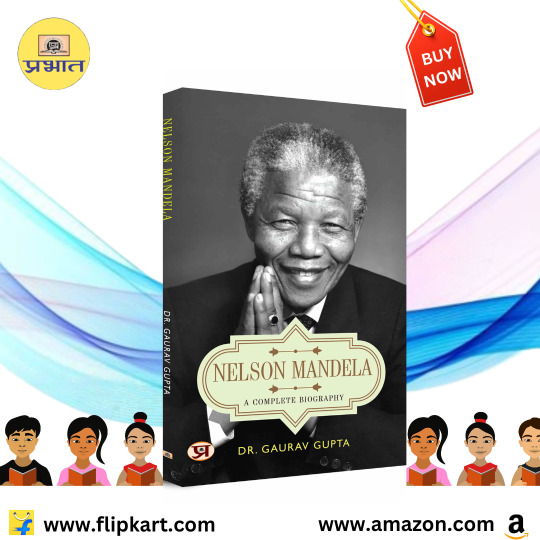
Read more :https://a.co/d/91ldUov
When he was expelled for participating in a student demonstration, the Regent urged him to either return or marry. As a result, he fled to Johannesburg with his cousin Justice. In 1941, he worked as a security guard on a gold mine before becoming a legal clerk at the law firm Witkin, Edelman, & Sidelsky. At the same time, he finished his BA at Unisa.
In 1943, he enrolled at Wits University to study law. He was a poor student who became more interested in politics after helping to establish the ANC Youth League in 1944. In the same year, he married and needed money to sustain his family.
He had three children by the time the university ordered him to pay the 27 pounds he owed or leave in mid-1952. In prison, he only resumed his studies in 1962. After 27 years, he eventually received his LLB from Unisa.
He then became the National Volunteer-in-Chief of the Defiance Campaign against apartheid legislation in 1952. Later, he and 19 others were accused and sentenced to nine months in prison, suspended for two years.Nelson Mandela & Tambo, South Africa's first black legal firm, was founded in August by him and Oliver Tambo.
A two-year diploma was sufficient to practice as an attorney back then. The following year, he was prohibited for the very first time, and he had to get official authorization to leave Pretoria. 156 persons were imprisoned and charged with treason following the ratification of the Freedom Charter in 1955. The trial lasted four and a half years, until 29 March 1961, when all defendants were acquitted. After the police death of 69 unarmed protestors in Sharpeville on March 21, 1961, the ANC and PAC were banned.
Read more:https://www.flipkart.com/viewcart?exploreMode=true&preference=FLIPKART
#nelsonmandela#southafrica#mandela#nelsonmandelaquotes#mandeladay#africa#madiba#nelsonmandeladay#quotes#motivation#capetown#blacklivesmatter#love#education#apartheid#freedom#pretoria#inspiration#motivationalquotes#johannesburg#inspirationalquotes#art#o#explore#quoteoftheday#martinlutherking#covid#nelsonmandelaquote#travel
0 notes
Text
Long Walk To Freedom by Nelson Mandela: What I Noticed By AQ

3 Interesting Facts About This Author:
Born on July 18, 1918
Born at Mvezo
Nelson writes books capturing his life and what went on...
Long Walk To Freedom is an autobiography of icon Nelson Mandela talking about the anti-apartheid movement in South Africa. The book explains his early life, education, and his years spent in prison. He was able to overcome the negative suffering he went through to become a world liberation leader.
Some key points:
There are several protagonists in this book.
Nelson is obviously a focus and the book details how he became the first Black president of South Africa.
Evelyn Mase is Nelson Mandela's first wife.
Dr. Daniel Malan is the leader of the Nationalist Party.
Oliver Tambo is Nelson Mandela's law partner and the pair opened a law firm in the early 1950s.
Some keys events stood out to me:
Nelson's father dies when he is only 12 years old in 1927.
Part of the book I found most interesting is on page 34 because Nelson chose to leave home to obtain the education he deserved in order to fulfill what he truly wanted to do in life.
I liked this book because it talks about what Nelson did for himself and his community. Most importantly, he passed through hard times and made the best of it.
0 notes
Text
Dr G Hough Endocrinologists
Our precious darling wife, mommy, and granny - one month of unspeaka ..... Dear mom, I am missing you a lot, love you tons... I am devastated at your passing and am considering of all the household and wishing them long life.
ANC president Nelson Mandela refers back to the anger of the Youth and Cosas Groups. The fencing of twenty-eight hostels, a ban on the carrying of weapons and the formation of the National Government Unity. Radio South Africa report on Radio Today by Douglas Mc Clure on the life and career of ANC leader Mr Nelson Mandela. Radio 2000 Funeral of Oliver Tambo the previous president of the African National Congress Mr. Oliver Tambo - Commentary and speech delivered by Nelson Mandela; prayers; singing. Service Radio RSA general- Class actuality- assembly between the SA authorities and ANC. Concept information convention in Pretoria after a meeting between the SA government.
Difficult to believe it's already one 12 months since Anthony handed. Always in our ideas and memories of fine times shared and tons of conversations. It's been virtually a yr because you had passed...it feels surreal and all of us nonetheless miss and take into consideration you everyday. Not a day goes by granny, the place you aren't talked about or remembered, from cooking to films, you might be always in my coronary heart . Mommy/Bobbie, We miss you on a regular basis. We love you with all our hearts.
There was nice excitement among the many boys and girls and the Kingswood “gees” was in full force. This week, our #WellnessWednesday slot comes from our Counselling Psychologist, Mrs Teresa Yell. In her piece this week she delves into what it means to be self-aware and the way we are in a position to turn into more self-aware of our actions and their consequences. A few weeks in the past, at our Senior School Prizegiving Ceremony, Dr Colleen Vassiliou gave a speech as Head of the College. This year has been a very different year not just for our faculty, but certainly our country and the world at massive. The recurring message all through her speech was looking at how we've all adapted to this very difficult year and that we are actually and actually the “Hero’s of our own story”.
dr gregory facebook
Mandela speaking about his 27 years of imprisonment. FW De Klerk's announcement of the discharge of Nelson Mandela from prison. Reactions by US political leaders to the information of Nelson Mandela's release from prison.
I am positive I'm not the one one who feels that means. Happy Birthday dad, eighty five today! I feel you around me, I think of you ..... Happy Heavenly Birthday my stunning Mum...plenty of roses, cheesecake .....
#dr gregory hough south africa#dr greg hough south africa#dr gregory#dr greg hough#greg hough#dr gregory hough#dr gregory images#dr greg hough images#dr gregory facebook#dr greg hough facebook
1 note
·
View note
Text
Dr G Hough Endocrinologists
Our precious darling wife, mommy, and granny - one month of unspeaka ..... Dear mom, I am missing you a lot, love you tons... I am devastated at your passing and am considering of all the household and wishing them long life.
ANC president Nelson Mandela refers back to the anger of the Youth and Cosas Groups. The fencing of twenty-eight hostels, a ban on the carrying of weapons and the formation of the National Government Unity. Radio South Africa report on Radio Today by Douglas Mc Clure on the life and career of ANC leader Mr Nelson Mandela. Radio 2000 Funeral of Oliver Tambo the previous president of the African National Congress Mr. Oliver Tambo - Commentary and speech delivered by Nelson Mandela; prayers; singing. Service Radio RSA general- Class actuality- assembly between the SA authorities and ANC. Concept information convention in Pretoria after a meeting between the SA government.
Difficult to believe it's already one 12 months since Anthony handed. Always in our ideas and memories of fine times shared and tons of conversations. It's been virtually a yr because you had passed...it feels surreal and all of us nonetheless miss and take into consideration you everyday. Not a day goes by granny, the place you aren't talked about or remembered, from cooking to films, you might be always in my coronary heart . Mommy/Bobbie, We miss you on a regular basis. We love you with all our hearts.
There was nice excitement among the many boys and girls and the Kingswood “gees” was in full force. This week, our #WellnessWednesday slot comes from our Counselling Psychologist, Mrs Teresa Yell. In her piece this week she delves into what it means to be self-aware and the way we are in a position to turn into more self-aware of our actions and their consequences. A few weeks in the past, at our Senior School Prizegiving Ceremony, Dr Colleen Vassiliou gave a speech as Head of the College. This year has been a very different year not just for our faculty, but certainly our country and the world at massive. The recurring message all through her speech was looking at how we've all adapted to this very difficult year and that we are actually and actually the “Hero’s of our own story”.
greg hough
Mandela speaking about his 27 years of imprisonment. FW De Klerk's announcement of the discharge of Nelson Mandela from prison. Reactions by US political leaders to the information of Nelson Mandela's release from prison.
I am positive I'm not the one one who feels that means. Happy Birthday dad, eighty five today! I feel you around me, I think of you ..... Happy Heavenly Birthday my stunning Mum...plenty of roses, cheesecake .....
#dr gregory hough south africa#dr greg hough south africa#dr gregory#dr greg hough#greg hough#dr gregory hough#dr gregory images#dr greg hough images#dr gregory facebook#dr greg hough facebook
1 note
·
View note